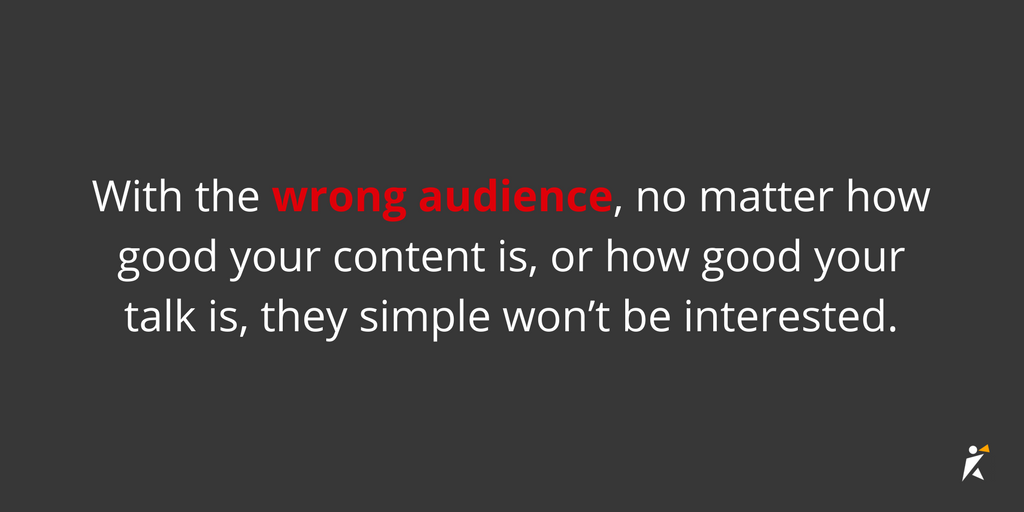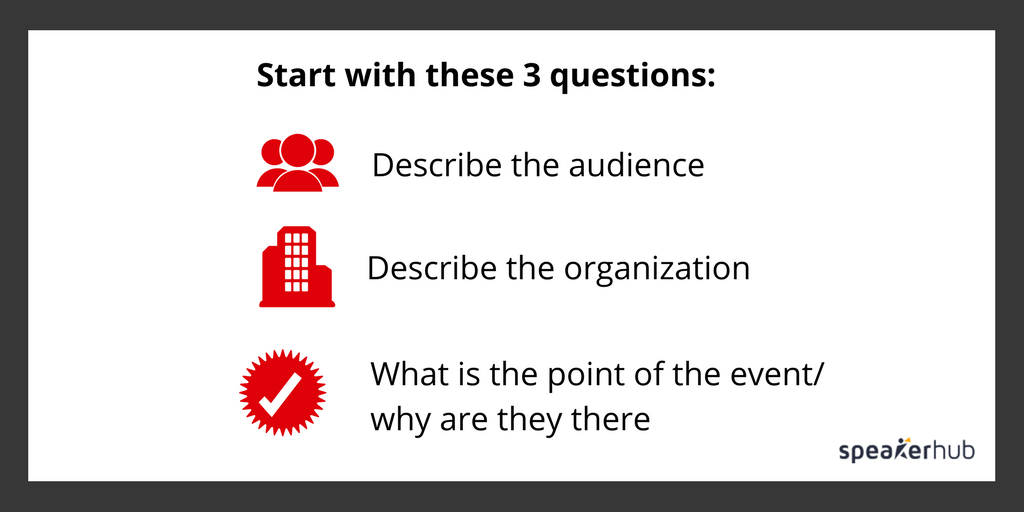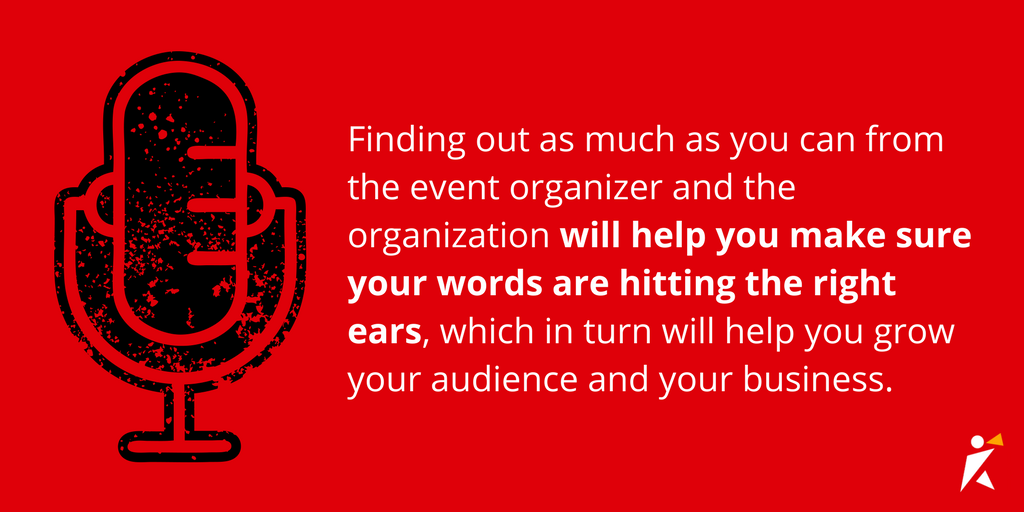Find an audience who gives a damn

You spent years researching your niche topic: and you’ve got unique insights that you’re excited about sharing.
You’ve spent weeks crafting your talk: you’ve got the perfect opening line, your sequence of points is exactly correct, and you’ve found a good balance of stories and lessons.
You’ve practiced—you know just how long to pause after the joke in the second section, you’ve got polls and media to engage your audience, and a great slider filled with impactful quotes and images.
You get on stage, and deliver your talk flawlessly—perhaps even better than your last run through in front of the mirror.
But after your last line, you get a measly handful of claps, as unsmiling people begin shuffling out of the room.
It's a speaker’s nightmare. One of the worst things that can happen, save for inexplicably having to present your talk naked.
What the heck happened?
We often revert immediately into thinking it was us—but truth be told, sometimes it is simply the wrong audience.
The wrong audience
With the wrong audience, no matter how good your content is, or how good your talk is, they simple won’t be interested.

It would be like Yale’s Martin Hägglund explaining continental philosophy to a kindergarten class, and then wondering why they aren’t participating in the discussion.
Or top chef Wolfgang Puck explaining exactly how to cut a perfect wagyu kobe steak to a group of vegan activists and being puzzled why half the audience walk out.
So, these are extreme example, sure—but the things is, that no matter how good their insights, content, or presentation skills are, they are simply never going to get their message across effectively to that audience.
And if Wolfgang keeps on offering talks to vegan activist, eventually he will begin to think he simply isn’t very good, and he might even throw in the towel.

The right audience
If your purpose is to inform, persuade, influence, or entertain: you’ve got to make sure that there are a few things lined up between you and your audience before you accept the speaking opportunity.
Here is a short list:
-
You have similar values
Example: If the Wolfgang Puck talks to vegan activists about meat carving veal, he is probably not going to get a great response.
-
They actually need your insights
Example: Kindergartener’s don’t need Martin Hägglund’s insights on continental philosophy at this stage in their young lives.
-
It culturally make sense
Example: Talking specifically about beer drinking to a group of devout Saudi Arabians won’t resonate.
-
The content is age/situation appropriate
Example: If you are going over key football team tactics to knitting circle in a retirement home, you will probably end up with more than one bored knitter.
While this list is non-exhaustive, it should give you an idea of why it is important to make sure you are offering your talk in front of the right audience.
Finding an audience who gives a damn
The best way to find out if you are getting in front of the right audience will be to do your research and ask the event planner.
Don’t accept a speaking opportunity until you’ve found out who the audience is going to be, and whether your talk is going to be appropriate or not.
Start with these 3 questions:
-
Describe the audience
-
Describe the organization
-
What is the point of the event/why are they there

This should give you a really good idea, but you can definitely dive a bit deeper, with questions that will not only help you decide if you are the right kind of speaker, but also whether or not you can tailor your content specifically for them.
Ask about:
-
Their knowledge and interest in the topic.
-
What does the audience already know about your topic?
-
Do they need your insights?
-
Which insights will be most helpful to them?
-
What is the business/organization/industry climate?
-
What are their recent successes and failures?
-
What is their general attitude towards your topic?
This will help you decide how specific you need to go, and whether your talk will be a “general knowledge” or an in-depth exploration of trends and research.
How receptive your audience will be to your message can be a major factor in whether it is going to go well.
If they are excited to learn about it, you can jump right in. If your topic is controversial or a large portion of the audience already disagrees with you, you are going to need to spend more time persuading them to get get on board.
-
The demographics
-
Age Range
-
Socio-economics
-
Dominant cultural background
-
Their general political standing/current feeling about the political atmosphere
-
Specific group values?
While you’ll want to avoid stereotyping and only focusing on demographics, by finding out a lot about who is going to be in your audience will help you decide whether or not your topic is going to flop or fly.
-
Their content expectations
-
Why are they there?
-
What would you like them to do differently as a result of the talk?
-
Is there anything I should emphasize/avoid?
-
What do they expect?
Are you actually able to deliver? To meet their needs? Will this help both you and them?
Make sure you know what the audience thinks they are going to get out of the talk.
Finding out why they are there to see you will help you meet their needs.
-
The tone of the event
-
Describe what the tone of the event is going to be
-
What time will I speak?
-
What is the venue?
-
What will happen before/after the event?
If you are not a comedian, getting up in front of a group that are expecting to spend the next 30-minutes in gut-busting laughter is not going to work.
Vice-versa: if you have a hard time being serious and staying on point, and the audience is a highly professional, intellectual, and the event is tightly scheduled, you might not be the right fit.
The timing and setting of your talk will also have a major effect on the tone you should adopt.
Check with the event organizer, show your personality, don’t pretend to be something you aren’t—it will jeopardize your authenticity and your ability to offer a successful talk
If you think you’ve got the right audience, but you may need to adapt your talk a little to suit them better, read this article “Knowing your audience: the key to adapting your presentation”
Often, an audience will be a large mix of people, but finding out as much as you can from the event organizer and the organization will help you make sure your words are hitting the right ears, which in turn will help you grow your audience and your business.

What are some of the ways you make sure you are in front of the right audience? We would love to hear from you, write to us to share your thoughts.





